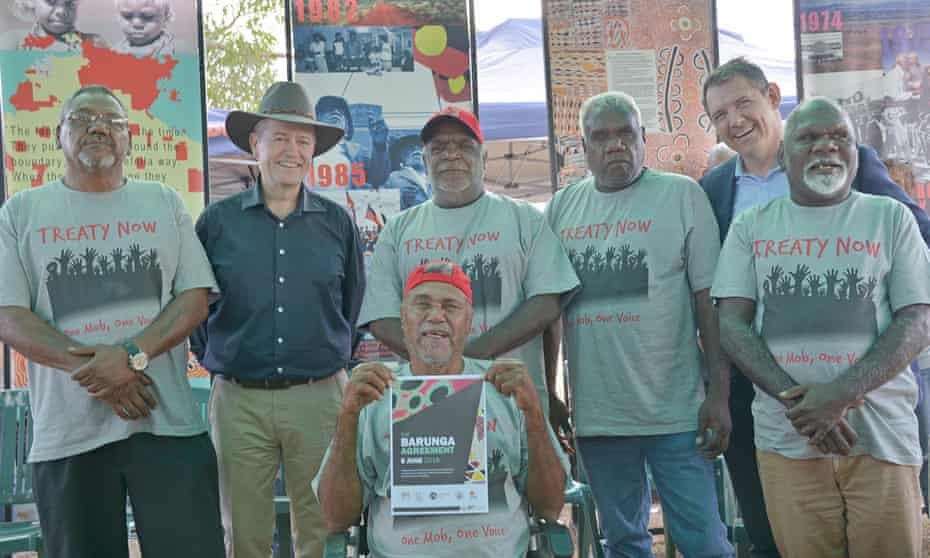In summary:
- The Northern Territory Government, following agreement with the NT’s Land Councils, is beginning a process of making a treaty with the Aboriginal peoples of the Northern Territory.
- Congress supports the Treaty process and believes that a Treaty could lead to better health outcomes for Aboriginal people through increasing the control our people have over their own lives; and through improved partnerships with Government for the provision of health services.
- Congress supports the right of each Aboriginal Nation to decide for itself how to engage with and implement a Treaty process and what services or programs to include as part of the Treaty agreement. However, an Aboriginal governance structure should be established of senior community and organisational representatives to oversee and review the Treaty-making process.
- Congress also believes that the Treaty process should allow for sector-level treaties across the Northern Territory (e.g. a Treaty for health; or for education; or for housing).
What is this about?
In June 2018, the Chief Minister of the Northern Territory and the Chairs of the four Northern Territory Aboriginal Land Councils signed the Barunga Agreement to begin the process of making a Treaty with the Aboriginal peoples of the Northern Territory.
In March 2019, the Northern Territory Treaty Commission began to consult with Aboriginal people to inform the development of a framework for negotiating a Treaty.
The Treaty Commission published a Discussion Paper in 2020 and has sought feedback on it.
What does Congress think about this?
Other developed countries with Indigenous peoples, such as New Zealand, the United States and Canada, have recognised treaties between their First Nations and their national governments. The international experience is that treaties with Governments can lead to better health outcomes for Indigenous peoples.
In Australia, a treaty or treaties could include a recognition of sovereignty and the right to self-determination, including through Aboriginal community-control of health services and enduring partnerships with Government in policy and planning.
A treaty in the Northern Territory may have positive health effects for Aboriginal people through two processes:
- There is a strong relationship between disempowerment and poor health. The exposure to stress associated with lack of ability to exercise control in life can undermine physical health and social and emotional wellbeing. The formal recognition that a treaty embodies – and the practices of self-determination that flow from it – could increase Aboriginal people’s control over their own lives and therefore lead to better health outcomes.
- Treaties are able to establish long-term arrangements for the planning and provision of health services. This can be expected to contribute to a more effective, stable and sustainable health system for Aboriginal communities.
What does Congress thinks need to be done?
The Congress Board of Directors discussed the Northern Territory Treaty process at their meeting on 14 October 2021, and approved a response to the Treaty Commission, containing the following points.
Self-determination, treaties and health
Congress asks that the Northern Territory Treaty Commission considers the evidence regarding the potential for improved health for Aboriginal people in the Northern Territory that may flow from the successful negotiation of a Treaty through:
- increased control of Aboriginal people over their own lives; and
- improved arrangements for the provision of health and other services.
Treaty background
Congress also:
- supports a Treaty on the basis that it must achieve real, long term, benefits for Aboriginal people, particularly in health outcomes as measured by the National Agreement on Closing the Gap targets;
- states that a Treaty must recognise that Aboriginal people continue to be the owners of the land, seas and waters of the Northern Territory as that ownership has never been given away and sovereignty never relinquished;
- agrees that a process of truth-telling and a formal comprehensive apology for past wrongs must be part of the Treaty process; and
- asks that the Treaty Commission includes an analysis of the effectiveness of community control in delivering better health services in the Northern Territory.
Legal Issues
Congress asks that the Treaty Commission ensures that the Treaty process addresses:
- the relationship between a Northern Territory Treaty and a national treaty as demanded by the Uluru Statement from the Heart; and
- the risk of future Commonwealth action that might undermine a Treaty, for example by seeking formal endorsement of a negotiated NT Treaty by the Commonwealth.
Proposed framework and model for the Northern Territory
The Discussion Paper expects that a Treaty Framework will allow each Aboriginal Nation to negotiate its own Treaty with the Northern Territory Government.
Congress supports the right of each Aboriginal Nation to decide for itself how to engage with and implement a Treaty process and what services or programs to include as part of the Treaty agreement.
To support this process, an overarching Aboriginal governance structure should be established of senior community and organisational representatives to oversee and review the process of Treaty-making across the Northern Territory.
Congress also calls on the Treaty Commission to ensure that the Treaty process allows for sector-level treaties for services or programs across the Northern Territory in a particular sector (e.g. a Treaty for health; or for education; or for housing).
What happens next?
The Treaty Commission plans to deliver a Final Report to the Chief Minister on the outcomes of consultations and recommendations for further action in March 2022.
Congress will continue to advocate strongly for the rights of Aboriginal people to health and self-determination through the Northern Territory Treaty process.
Find out more
Congress Position Paper on Treaty and Health (July 2002)
Northern Territory Treaty Commission website https://treatynt.com.au/
